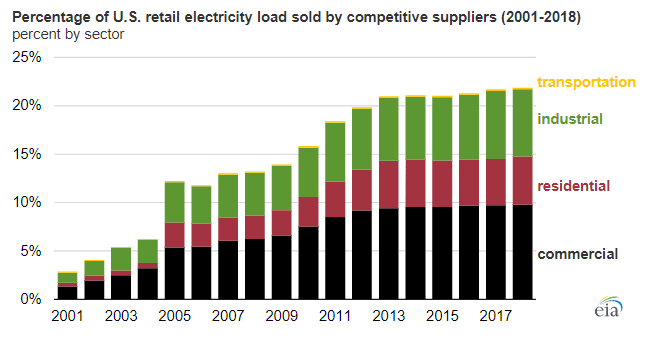Retail Choice Power Market Growth Slowed Since 2013 Amid Higher Costs for Residential Customers: EIA

The share of U.S. electricity sales by competitive suppliers increased slightly since 2013 following over a decade of steady growth, according to a Nov. 1 report from the U.S. Energy Information Administration. While customer choice programs use competition to lower power prices and introduce new service products, not all customers pay less for purchasing power through non-utility retail power marketers, the agency said. Suppliers are likely to offer more competitively priced contracts to large customers, the agency noted.
In general, residential customers have spent more per kilowatthour to buy power from competitive suppliers than noncompetitive suppliers, but commercial and industrial customers paid less. Although residential and small commercial customers do not have the advantage of large users, they may from purchasing groups as in California, where community choice aggregators allow local governments to buy electricity and negotiate rates on behalf of their customers. Some states allow local governments to opt for private aggregators.
Most states with competitive retail electricity programs have required utilities to sell off their generation. Utilities supply their customers by purchasing energy from the lowest bidders through auctions or competitive solicitations, making it more difficult for retail power marketers to offer lower prices.
Retail choice programs may offer prepaid plans or variable priced contracts for large commercial and industrial customers, or contract with renewable energy providers allowing customers the opportunity to finance new wind and solar generation. Many customers have been willing to pay more to source energy through renewable suppliers, according to the agency.
Nineteen states and the District of Columbia allow some commercial and industrial customers to choose power marketers. Of these, fifteen of those states and DC allow customers in all sectors to participate in retail choice programs.
EnerKnol Pulses like this one are powered by the EnerKnol Platform—the first comprehensive database for real-time energy policy tracking. Sign up for a free trial below for access to key regulatory data and deep industry insights across the energy spectrum.
ACCESS FREE TRIAL